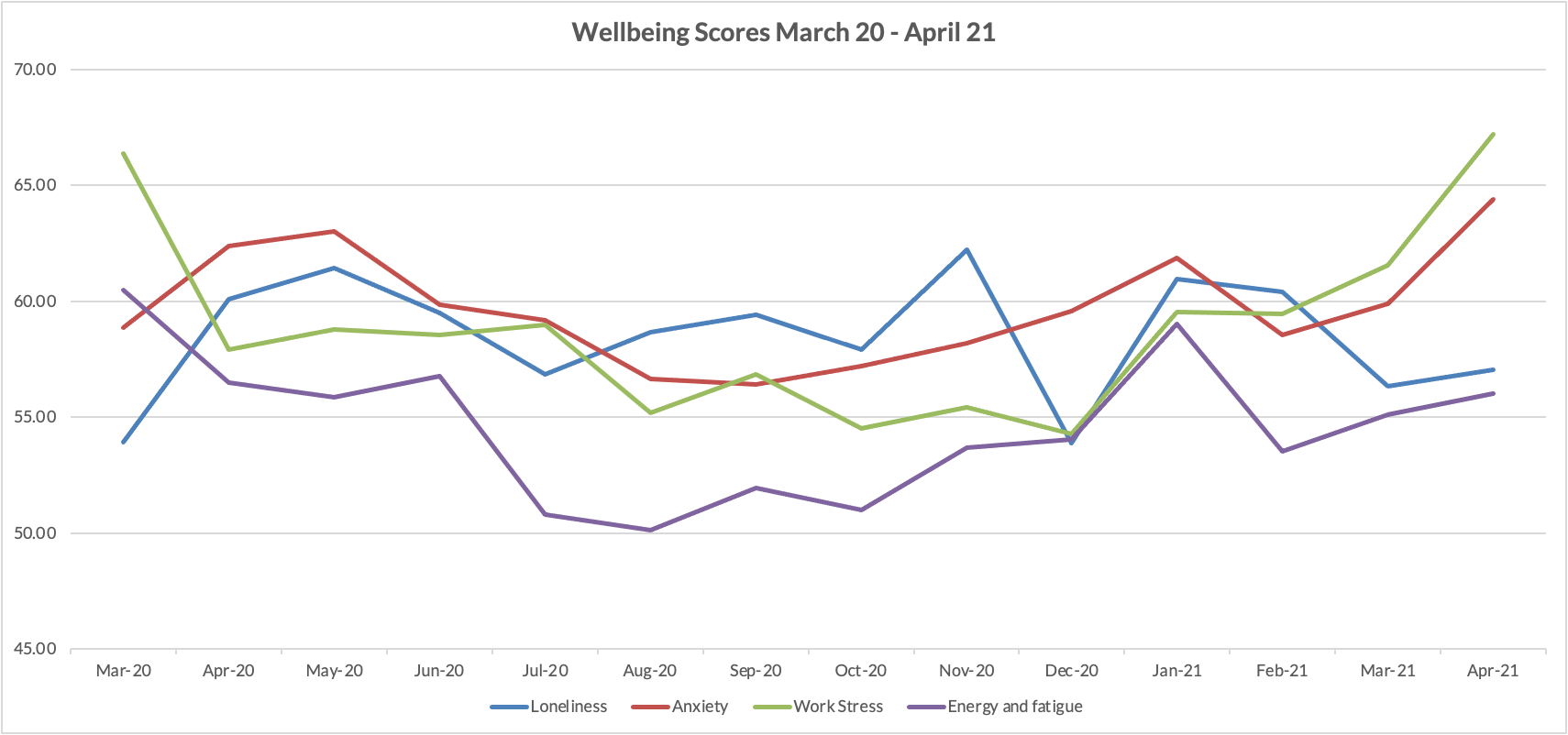What have the last 12 months taught us about mental fitness?
Twelve months and counting from the announcement of lockdown in the UK and life remains unrecognisable. Even though the vaccine roll-out is making undeniable progress, tight controls remain in place that restrict our social interactions and a lack of perceived freedom has huge implications on our state of wellbeing.
While COVID poses the gravest threat to the physical health of the elderly and men slightly more than women, the effects on mental wellbeing are being felt most significantly by women and the younger generations; according to recent YouGov data, 50% of women and 55% of 18-24 year olds have described their mental health as ‘worse’ in the latest lockdown than in the first.
Raising awareness of the issues that we have all faced over the last year has decreased the stigma of mental health, allowing for more open conversations about the topic, while 87% has given thousands of workers access to its platform to help them understand how to build mental fitness to lead happier and more fulfilled lives.
Yet, there is still work to be done to understand what can be done for groups who are more vulnerable to poorer wellbeing (as above). We must also develop our knowledge of the effect of the past 12 months on the mental and physical fitness of communities and workplaces and understand the power of digital tools for mental healthcare across the wellbeing spectrum as we look forward to a period of recovery from the COVID-19 pandemic.
How are we feeling?
87%’s own data shows how a range of metrics can be used to demonstrate mental fitness, from anxiety and loneliness to fatigue and work stress and there are stark contrasts in the data across these measurements.
For example, despite lockdown restrictions easing and the return of social gatherings outside, current loneliness wellbeing scores are lower (indicating poorer mental health) than the same time last year, and they’ve even dropped since the turn of the new year. This is particularly acute for students who have not had the experience of studying they would ordinarily have. Recent ONS data shows that over a quarter (26%) of university students feel lonely often or always, compared with only 8% of the adult population. Energy and fatigue too are lower than figures for the same time last year - they dipped in April 2020 and have not recovered to previous levels.
Fortunately, it’s not all bad news. Wellbeing scores for anxiety and work stress are the highest they have been (indicating stronger mental health) in over a year.
Source: 87% Data.
Digital delivery
If anything positive can be gleaned from the pandemic, it’s that social distancing brought with it an increase in the use of digital tools to deliver healthcare. According to a recent report by ORCHA, the world’s leading, independent digital health evaluation and distribution organisation, the number of people searching for mental health apps increased by 200% during lockdown. But, while digital platforms can increase accessibility to treatment, we’re not celebrating this as a panacea just yet, for two reasons.
Firstly, more research is needed to understand the effectiveness of such a broad range of digital health tools. Based on ORCHA’s evaluation, only 32% of mental health apps on the market meet minimum quality standards. Some freely available apps are reported to have poor data privacy or clinical backing, unlike 87%, which is fully confidential and has been approved by ORCHA following a comprehensive review.
Preventative steps to better mental health for all
Secondly, focusing on treatment for those with mental health challenges, which is 1 in 4 of us every year, is a problematic approach to achieving better wellbeing for all. Using digital tools to deliver preventative interventions at every point of the wellbeing spectrum is a holistic and modern approach to help people build mental fitness.
What is mental fitness?
Mental fitness means being in your best mind to approach life with positivity and purpose. As with physical fitness, everyone’s ideal level of fitness is different, as are the resources available and barriers to overcome to achieve these goals. Developing mental fitness equips you with the means of your enjoyment of positive experiences and helping you overcome challenges. It’s part of everyday life.
Importantly, there is no such thing as perfect mental fitness; it can be continuously developed and improved to enhance the way you live your life through strong and meaningful relationships, the determination to achieve your ambitions and peak performance.
The future of mental health
It is 87%’s vision for mental health that all businesses recognise the need for measures to be put in place that ensure that the workforce is given resources to perform at their peak. And we don’t mean just at work. Building mental fitness promotes happiness and health in our personal lives, as much as it improves performance and productivity in the workplace.
Employers can be part of this innovation by investing in digital tools that, with the power of data, can provide insights into the health of any organisation and transform business efficiency and productivity. Businesses that can develop a culture where wellbeing is the foundation of a productive team, and empower their workforce to make positive changes to their daily lives, will reap the benefits of their investment many times over by unlocking the potential of their staff.



